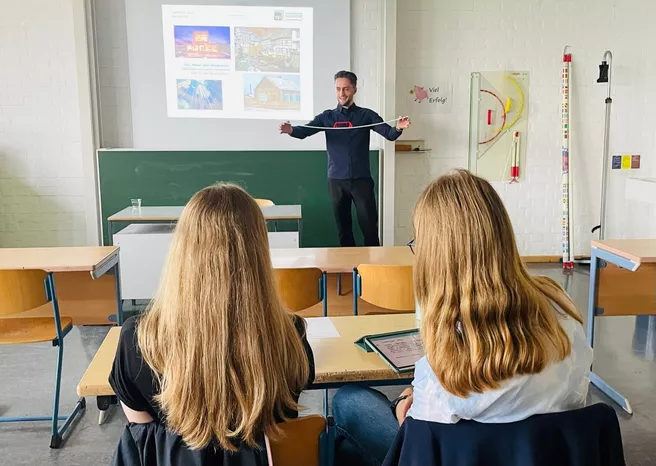Interview and Photos: Cornelia Freund
ED: Let's start with your academic background. You have a bachelor's degree in civil engineering. What has been your path so far?
Paul Tuch: It's been an exciting journey. I've always loved math, and my big inspiration has been designing buildings that are truly one-of-a-kind. Civil engineering provided me with a strong foundation in mathematics and physics, and it's fascinating to see how that knowledge intertwines with the principles of engineering and construction. What is the optimal structure for a bridge? What ecologically sound and economically viable materials do I use? It's a good thing to care about the future of our landscape and built environment.
Now you are working on your master's degree in computational mechanics.
At the beginning of my studies, I would never have thought of becoming a programmer. That's a big plus at TUM: Everyone can try things out, set individual priorities, crystallize strengths. In my case, computational engineering goes one step further by using computational tools to analyze and solve complex technical problems. I think it's important to be innovative in engineering. With the qualifications and experience I have, I can help to shape our society and our planet.
What inspired you to teach civil engineering to high school students? What is your experience as a teacher?
I have always had a passion for aesthetic building design and have enjoyed taking responsibility. This project allows me to combine these two interests and share my experience with young people. If I can open new perspectives for the students, if they learn about the diversity and importance of civil engineering, it motivates me to keep going.
How do you introduce civil engineering to the students so that they become interested?
I try to connect with the subject and show them the real-world applications of civil engineering. For example, I explain how engineers design and construct bridges, skyscrapers, and infrastructure that we use in our daily lives. I also emphasize the importance of sustainability in engineering practice and show how we can design structures that have a positive impact on the environment.
Sustainability is an important aspect of engineering in today's world. How do you incorporate this aspect in your Q&A sessions with prospective students?
I believe that instilling the value of sustainability early on is essential. I talk about eco-friendly construction materials, energy-efficient design, and the role of civil engineers in creating a more sustainable future. I encourage them to think about how their choices as engineers can contribute to a more environmentally conscious society.
What do you want students to take away from your presentation on civil engineering?
My primary goal is to spark their curiosity about engineering. I want them to see that mathematics is not just a school subject, but a powerful tool that can be used to create remarkable structures. And I hope they understand that engineering is not just about building things, but also about solving problems creatively and analytically and making a positive impact on people's lives.
How has your experience and knowledge impacted your career?
My background in civil engineering has been immensely valuable. The knowledge of construction principles and structural analysis has given me a solid foundation to explore the more advanced aspects of computational mechanics. Understanding how things are built in the real world allows me to better model and analyze them in the virtual world. I can't say exactly where my path will take me, but I wouldn't rule out a doctorate at this point.
The project
By students for students: Civil engineering students inform pupils in a relaxed and motivating way about their degree program and the profession of civil engineering. As part of information days or P-seminars at schools, the staff of the "Promotion of Young Talent" project team give pupils the opportunity to ask their individual questions about studies and careers. To meet the growing demand for engineers in the construction industry in Germany, VBI Bayern and the Technical University of Munich have developed the concept for information offers at grammar schools and technical secondary schools.
Young people are given an authentic insight into everyday study life and a realistic outlook on later working life. The advantage of the information provided by students is that they have recently been in the same situation and can answer the students' questions from their own experience. The concept developed by the project team has now established itself as a lively and interactive roadshow at 30 schools in and around Munich.
Links and Contact
Contact for interested schools: ing.bm(at)ed.tum.de
Information on the degree program Civil Engineering B.Sc.
Video about the degree program Civil Engineering B.Sc.

